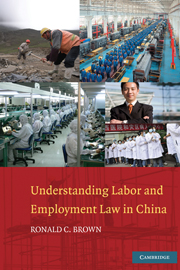Book contents
- Frontmatter
- Contents
- Preface
- Acknowledgments
- Understanding Labor and Employment Law in China
- PART I UNDERSTANDING CHINA'S REGULATION OF THE WORKPLACE
- PART II EMPLOYMENT RELATIONSHIPS
- PART III HIRING AND EMPLOYMENT PRACTICES
- 6 Hiring and Employment Practices and the Law
- 7 Employment Antidiscrimination Laws
- PART IV WORKING CONDITIONS, WAGES, AND HOURS
- PART V EMPLOYEE BENEFITS: LEAVES, MEDICAL, MATERNITY, WORK-RELATED, UNEMPLOYMENT, AND PENSION INSURANCE
- PART VI DISCIPLINE AND TERMINATION UNDER EMPLOYMENT AGREEMENTS
- PART VII RIGHTS, REMEDIES, AND MULTIPLE FORUMS
- Appendix
- Index
- References
7 - Employment Antidiscrimination Laws
Published online by Cambridge University Press: 22 January 2010
- Frontmatter
- Contents
- Preface
- Acknowledgments
- Understanding Labor and Employment Law in China
- PART I UNDERSTANDING CHINA'S REGULATION OF THE WORKPLACE
- PART II EMPLOYMENT RELATIONSHIPS
- PART III HIRING AND EMPLOYMENT PRACTICES
- 6 Hiring and Employment Practices and the Law
- 7 Employment Antidiscrimination Laws
- PART IV WORKING CONDITIONS, WAGES, AND HOURS
- PART V EMPLOYEE BENEFITS: LEAVES, MEDICAL, MATERNITY, WORK-RELATED, UNEMPLOYMENT, AND PENSION INSURANCE
- PART VI DISCIPLINE AND TERMINATION UNDER EMPLOYMENT AGREEMENTS
- PART VII RIGHTS, REMEDIES, AND MULTIPLE FORUMS
- Appendix
- Index
- References
Summary
Protected Status and Hiring Practices
In China, there are a number of protected classes against which employment discrimination is prohibited. There also are some statuses that are largely unprotected, such as age and height and some that lack meaningful enforcement provisions, such as disability. Maternity and child labor and sexual harassment have special protections.
In China, hiring procedures often openly discriminate on the basis of gender, social origin, and age. It is not uncommon to see or hear the following solicitation in a recruitment ad: “[S]eeking an office clerk. Female, decent height and appearance. All five facial organs must be in the right place (wu guan duan zheng).” Today in China, job advertisements with those facial requirements are widely seen. Such ads, of course, are but an explicit articulation of what many employers around the world take implicit note of in the employment hiring process. In practice, other factors in considering applicants and employees in China include sex, ethnicity, social origin, health, disability, age, or migrant status, but some of which are prohibited by Chinese labor laws.
The 1994 Labor Law's antidiscrimination provisions covered only employees and not applicants. The EPL extends this coverage to include applicants.
Of course, inequality and discrimination against different categories of employees occur in every society. China is interesting both because of the diversity of workers reportedly facing obstacles to equal employment opportunities and because of the sheer size of its labor force.
- Type
- Chapter
- Information
- Understanding Labor and Employment Law in China , pp. 75 - 102Publisher: Cambridge University PressPrint publication year: 2009



